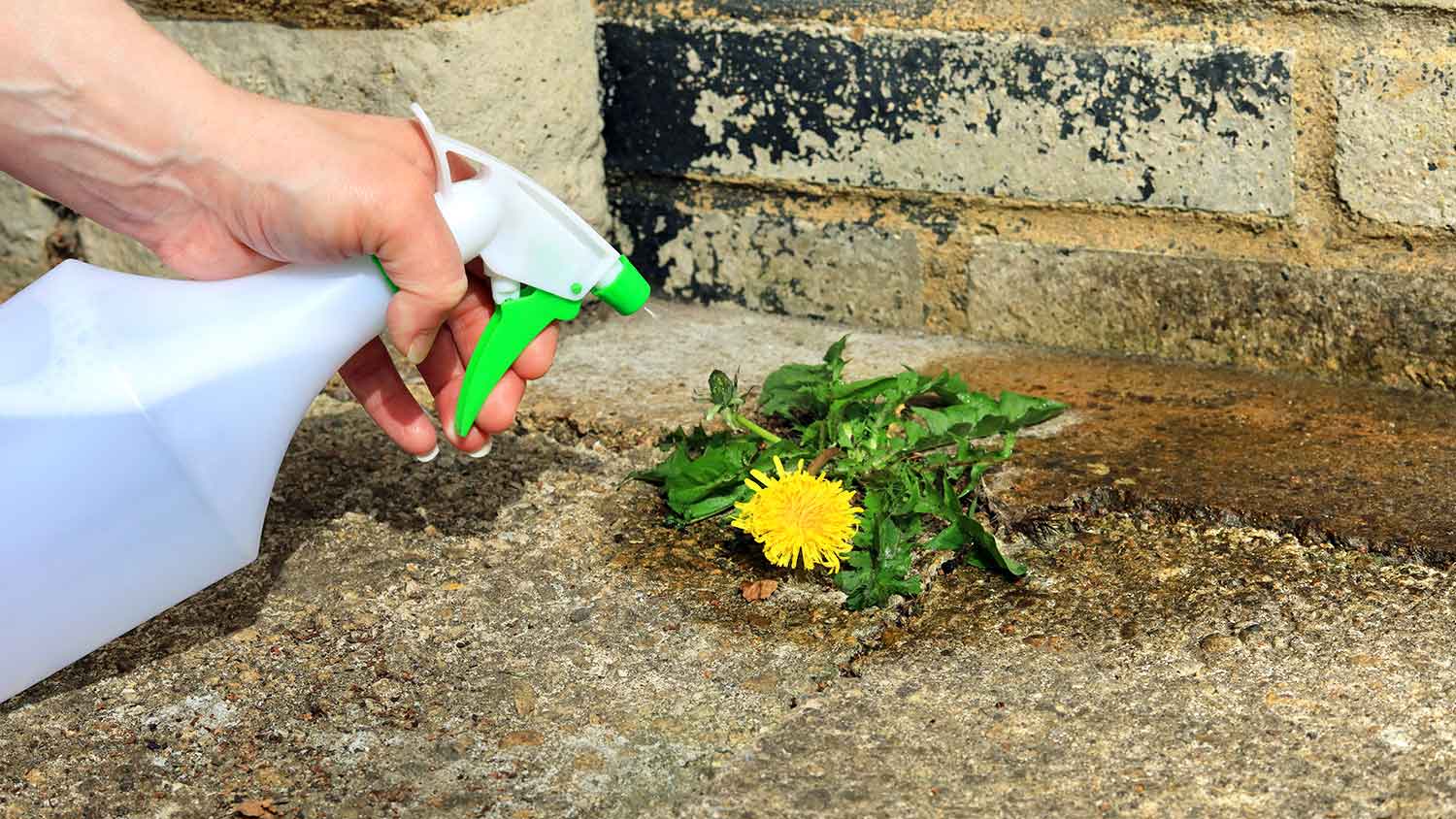Will Vinegar Kill Grass? What You Need to Know
Proceed with caution when using this contact herbicide


Vinegar can be effective at killing grass and weeds, drying them out completely.
Spreading vinegar on your lawn is risky because it can damage other plants that it comes in contact with.
Whether you are trying to get rid of weeds or snuff out stubborn sprouts of grass in the cracks of your sidewalk, you may be wondering whether you can use vinegar to kill grass. Many homeowners turn to DIY methods such as vinegar to get rid of weeds or grass growing in unwanted spots. Learn the effects vinegar has on grass and how to use it effectively.
Will Vinegar Kill Grass and Weeds?
Vinegar with a high acetic acid concentration (5-20% acidity) can kill grass. When vinegar is applied to grass and weeds, it can cause them to dry out and die. However, the downside is that vinegar can damage anything green that it touches. So if you accidentally spray vinegar on other types of plants or flowers, it can burn the foliage and kill them.
Another issue with vinegar is that its acidity can harm the soil. Vinegar can lower the soil pH, making it too acidic for plants to grow. So, it's essential to use it correctly and avoid using it near flower beds and gardens.
How Long Does It Take for Vinegar to Kill Grass?
Vinegar starts working pretty quickly and, in some cases, can kill weeds and grass within a day or two. However, the speed and effectiveness depend on factors such as the type of grass and weeds and the type of vinegar.
For instance, agricultural vinegar contains acetic acid levels between 20% and 30%, while white vinegar's acetic acid levels are around 5%. So, if you use white vinegar with lower acetic acid levels, it may not work as quickly and also take more applications.
Should You Use Vinegar to Kill Weeds and Grass?
While vinegar does kill weeds and grass, it may not be the best solution for various areas you need to remove weeds from. Vinegar can damage and kill anything it contacts, including flowers and other plants. It's not recommended to use vinegar to kill weeds in your yard because it will kill the grass, too, leaving dead spots behind.
Instead, consider hiring a lawn care professional near you to eradicate unwanted weeds and grass without harming your gardens and yard. That way, you can ensure high-quality and long-lasting weed results without risking the health of your lawn.
How to Use Vinegar to Kill Grass and Weeds

If you decide to try using vinegar to kill grass and weeds in areas such as a gravel driveway or sidewalk, it's relatively easy to do. Vinegar can be a natural way to get rid of pesky weeds and grass. But remember, you should not use it near any other plants.
You can purchase agricultural vinegar or mix up a homemade white vinegar solution and spray it directly onto the grass or weeds. Depending on the type of vinegar, you may have to make several applications to completely kill the grass or weeds. Ensure you spray carefully and never apply it near any beloved plants and flowers.
Frequently Asked Questions
If you spray a DIY vinegar solution that contains high salt, it can disrupt the soil's structure and make it difficult for plants to grow. That's why it's vital to avoid spraying vinegar solution on areas where you are trying to grow plants and flowers. When using a mix of vinegar and soap, some say you can plant a few days after the vinegar dries.
Vinegar is known to be a contact herbicide, which means it kills the foliage it comes in contact with. Because of the high acetic acid concentration, horticultural vinegar kills weeds and grass more effectively. However, keep in mind that high amounts and multiple applications can affect the soil by lowering the pH levels.





- Landscapers
- Tree Surgeons
- Gardening Services
- Landscape Architects
- Sod Installation
- Tennis Court Contractors
- Landscape Design
- Retaining Wall Companies
- Grading Companies
- Landscape Rock & Sand Delivery
- Mulch Delivery Services
- Pond Companies
- Artificial Grass Companies
- Shrub Removal & Trimming
- Backyard Design Companies
- Commercial Landscaping
- Koi Pond Services
- Backyard Landscapers
- Trampoline Assembly
- Hedge Trimming
- Pond Services
- Garden Design
- Outdoor Plant Watering
- Putting Greens
- French Drains
- Turf Installation
- Sod Removal Services
- Lawn Repair Services
- Brush Chipping Services
- Hardscape Contractor
- Landscape Rock Removal










